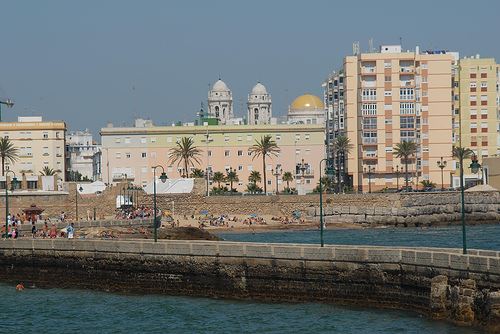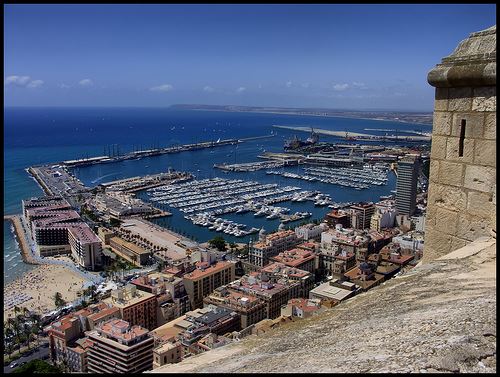Legal tip 873. 2013
Monday, December 31, 2012
.jpg)
 0
Like
Published at 10:55 AM Comments (0)
0
Like
Published at 10:55 AM Comments (0)
Legal tip 872. Case won against Huma Banks
Thursday, December 27, 2012
By Costaluz-DeCastro teams
The two financial institutions which were sued together with Huma, settled out of Courts: Banco de Valencia y Mare Nostrum
Good prospect for other Huma clients.
Balance growing! Banks punished!
Maria
.jpg)

"_MG_5767", Procession of the Three Wise Men in Cadiz, South of Spain, by _Lolo_, at flickr.com
 0
Like
Published at 7:25 PM Comments (0)
0
Like
Published at 7:25 PM Comments (0)
Legal tip 871. NEW Case Law on Banks Liability Law 57/68
Thursday, December 27, 2012
Most recent Court decission on Banks liability out of provision 1.2 of Law 57/68 has been issued by Lerida/ Lleida Appeal Court on last17th of October:
Remarks:
- Bank where money is deposited without opening of Special Bank Account ios liable if facts tell clearly Bank knew those paymenyts were off plan advanced amounts, object of protection of Law 57/68
- Amounts to be refunded from developer within the Bankruptcy proceedding can be deducted of the repayment by the BankRoj: SAP L 706/2012
Id Cendoj: 25120370022012100358
Órgano: Audiencia Provincial
Sede: Lleida
Sección: 2
Nº de Recurso: 528/2011
Nº de Resolución: 379/2012
Procedimiento: Recurso de Apelación
Ponente: ALBERT MONTELL GARCIA
Tipo de Resolución: Sentencia
AUDIÈNCIA PROVINCIAL DE LLEIDA
Secció segona
El Canyaret, s/n
Rotlle núm. 528/2011
Procediment ordinari núm. 1971/2010
Jutjat Primera Instància 5 Lleida (ant.CI-5)
SENTÈNCIA núm. 379/2012
President/a:
IL·LM. SR. ALBERT GUILANYÀ I FOIX
Magistrats/ades jutges/esses:
IL·LM. SR. ALBERT MONTELL GARCIA
IL·LMA. SRA. ANA CRISTINA SAINZ PEREDA
Lleida, disset d'octubre de dos mil dotze
.jpg)

"_MG_5775", Procession of the three Wise Men in Cadiz, by _Lolo_, at flickr.com
 0
Like
Published at 3:24 PM Comments (1)
0
Like
Published at 3:24 PM Comments (1)
Legal tip 870. Costaluz Lawyers video card. Christmas
Thursday, December 27, 2012
.jpg)

"_MG_5790", Cabalgata de Reyes in Cadiz, South of Spain, by _Lolo_, at flickr.com
 0
Like
Published at 2:37 PM Comments (0)
0
Like
Published at 2:37 PM Comments (0)
Legal tip 868. Que está pasando? ( Villancico I) Christmas Carol
Monday, December 24, 2012
.jpg)

"Navidad", Burgos, North-west of Spain, by Lumiago, at flickr.com
 0
Like
Published at 9:11 PM Comments (0)
0
Like
Published at 9:11 PM Comments (0)
Legal tip 867. Christmas letter from CostaLuz
Friday, December 21, 2012
Dear clients and EOS members:
As in the past, we like taking the chance of this season in order to wish you deep desires of peace and joy to fill your heart. At the end, this is what counts and make us happy and willing to grow in life.
During the December month, the team has gathered in different occassions for revision of strategies, values and missions. We have learnt, grown and enjoyed these days as a family. This is what we want to trasmitt to you. We are sending a video with some images to our clients these days.
We are not perfect. But have perfect desires to work for you in better and more effective ways all the time so you can recover trust in Spain and dream on coming back and spend good time of your lives in our beloved country. That is the core of our mission.
All at the team are strongly committed to that and to continued revision, improvement and growth: that has been one of the best gifts I have received this Advent-Christmas time. The new and enhanced testimony of the passion of the team.
We are launching very soon a tool that will enable you to check your files from your screen every time you need. We are improving and adding new services... We are enthusiastic about this all.
Forgive our human failures and appreciate our joyful efforts! All them are mixed up with great care, love and proffessionalism.
Looking forward to seeing many happy faces of clients along 2013.
Maria and the CostaLuz Lawyers team
.jpg)

 0
Like
Published at 1:41 PM Comments (0)
0
Like
Published at 1:41 PM Comments (0)
Legal tip 866. IESE´s on How Foreign Companies View Spain
Thursday, December 13, 2012
How Foreign Companies View Spain
Invest in Spain; ICC - International Center for Competitiveness
Publisher: IESE; Invest in Spain
Original document: Barómetro del clima de negocios en España desde la perspectiva del inversor extranjero
Year: 2012
Language: Spanish
Foreign companies continue to play a decisive role in the Spanish economy, providing 1.3 million jobs. In 2011, their net investment reached $29 billion, an increase of 20 percent over 2010.
These figures make Spain the world's ninth-highest receiver of FDI and reflect the relative attractiveness of the country in the eyes of foreign investors, even during these tough economic times.
These are some of the findings of the Barometer of the Business Climate in Spain prepared by IESE's International Center for Competitiveness in collaboration with Invest in Spain.
Generally Positive Outlook
Based on surveys of more than 250 companies, the barometer shows that 88 percent of the foreign companies operating in Spain expect to maintain or increase their exports in 2012.
Likewise, 70 percent expect to do the same with employment and investment levels, while 63 percent believe they can maintain or increase their revenues.
Foreign firms give the business climate in the country a score of 2.7 points out of 5, slightly lower than in 2011, although this barometer does not yet reflect the impact of the latest structural reforms implemented during the current fiscal year.
While foreign investors feel that Spain has made progress with its regulatory framework, the trend since 2011 has been negative in the other areas analyzed.
Investment Magnets
According to the companies surveyed, infrastructure, particularly airports and high-speed trains, is among the country's strong points.
They also rate the availability of skilled and unskilled labor, and cite the areas of leisure and culture.
Another advantage for Spain in attracting foreign investment is the size of its market, although respondents believe it is still lacking in terms of its dimensions and accessibility.
Human capital, the most important area for foreign companies, was also rated positively, albeit with room for improvement when it comes to proficiency in foreign languages, accepting responsibilities, learning capacity and availability of skilled labor -- all essential aspects for ensuring competitiveness over the medium and long terms.
Notably, the level of Spanish business schools continues to meet the expectations of foreign investors.
In addition, the quality of life index helps make Spain an attractive destination for expatriates and their families, who value the country's leisure and cultural offerings, as well as its health-care system.
The Flip Side
Spain's main problems involve finance, its weakest category overall. The ratings are especially low in terms of costs and availability of financing in commercial banking.
Innovation and overhead costs are two other areas that fared poorly in the survey. With regard to innovation, the most problematic aspect is the amount of public spending on RD&I and business applications.
As for the regulatory environment, foreign investors call for greater stability, believing there is ample room for improvement in the degree of bureaucracy faced by companies, a problem echoed by other international competitiveness indices, such as the Global Competitiveness Report 2012-2013 of the World Economic Forum.
In terms of taxation, companies feel that the corporate taxes and Social Security payments made by firms need improvement.
In the eyes of foreign investors, the labor market has some glaring deficiencies, especially with respect to incentives and aid for hiring.
Nevertheless, improvements have been made in aspects such as employee termination costs and adapting labor legislation to the needs of companies.
Specifically, 72 percent of respondents believe that the labor reforms have given the market greater flexibility, and 68 percent consider the collective bargaining reform as positive.
The areas requiring special attention due to their relevance for foreign companies are: proficiency in foreign languages, acceptance of responsibilities and objectives, the bureaucratic burden on companies' day-to-day activities, and incentives for hiring.
.jpg)

"Vista a La Linea", La Linea de la Concepción, Cádiz, South of Spain, by SirKnight, at flickr.com
 0
Like
Published at 2:13 PM Comments (0)
0
Like
Published at 2:13 PM Comments (0)
Legal tip 865. On Spanish Labor Reforms
Thursday, December 13, 2012
User's Guide to Spanish Labor Reforms
Segarra Torres, José Antonio; Carrillo, Jordi
Original document: Las medidas laborales de la empresa en situación de crisis
Year: 2012
Language: Spanish
Adapt to the new reality or perish: This is the dilemma faced by many Spanish companies, which are hanging on by the skin of their teeth in very hard economic times.
To help companies survive and preserve as many jobs as possible, the Spanish government has introduced several major changes to labor legislation related to the terms of employment and severance pay, the procedures to be followed in the event of mass layoffs, and the handling of collective bargaining agreements, among many other issues.
All of these changes are designed to strengthen companies' competitiveness and ensure their continuity in the face of a crippling economic crisis.
By changing work conditions related to wages and productivity, the reforms aim to make the Spanish labor market more stable and limit layoffs as much as possible.
In their technical note, IESE Prof. José Antonio Segarra and Jordi Carrillo review the legislative tools that are now at companies' disposal.
Greater Flexibility in Laying People Off
The most drastic measure is the termination of workers' contracts.
In the case of a wrongful dismissal, the reforms stipulate severance pay of 33 days per year worked, rather than the 45 days that applied before, with a maximum of 24 months' pay.
For a legitimate dismissal, the severance pay rate is 20 days' pay per year worked, with a maximum of 12 months' pay.
Significantly, legitimate grounds for dismissal can now include a company seeing its revenue fall for three straight quarters. This marks an important shift, as it is now easier for the employer to apply the 20 days per year clause, and it means fewer dismissals for market-based reasons will end up in court.
The authors also review the grounds for terminating an employee's contract under the Workers' Statute and the different procedures to follow depending on whether the dismissal is individual or collective.
The reforms have done away with a previous rule that required government permission for a company to carry out a mass layoff.
Once a layoff is announced, the company and its workers have one month to reach an agreement on severance terms. If no deal is reached, the company can still go ahead with the layoff, although workers maintain the right to appeal the decision.
Less Traumatic Alternatives
The reforms also allow for less drastic measures, such as modifying working conditions: temporary suspension of contracts, imposing geographic mobility and temporary wage cuts.
To this end, companies may modify collective bargaining terms, so long as certain economic, technical, organizational or production-related conditions exist.
The reforms let companies sidestep sector-based or geographic collective bargaining agreements for reasons beyond their control or if sales fall for two straight quarters.
Furthermore, the new regulations limit to a maximum of two years the indefinite extension of collective bargaining agreements if management and labor are unable to come up with a new one.
All of this weakens the negotiating leeway of major unions and business federations, enhancing the role of collective bargaining accords within the company itself.
In the technical realm, the authors note that during the application of a temporary mass layoff, the social security payments of workers who have been suspended, or who have seen their workdays reduced, are cut by half.
What's more, workers in this situation do not accrue vacation days or the proportional part of their Christmas and summer bonus pay.
As for early retirement, the reforms force large companies that are making a profit to pay the government a high percentage -- between 60 percent and 100 percent -- of what the government employment service pays to compensate workers who accept early retirement.
The authors point out that the reforms also address the problem of temporary work contracts, although in a timid fashion, by limiting to 24 months the maximum stretch of time that fixed-term contracts can be rolled over.
If a company declares itself bankrupt, the Wage Guarantee Fund guarantees disbursement of unpaid wages and severance pay.
However, this does not let the company off the hook completely. The government agency will seek to recover what it has paid out, working out a payment plan with the company that is in receivership, so long as this is possible and the company wants to stay afloat and not just fold.
Acting in Time
Even though the overriding goal of the labor reforms is to create stable and lasting jobs in the long term, the authors acknowledge that the short-term effect could be more unemployment.
The reforms opt for internal flexibility within a company, so as to keep layoffs from being the only alternative in a critical situation, aligning Spanish legislation with that of the rest of the European Union.
It's no magic wand, they say, but the reforms might just pave the way for job growth that is healthier and more robust in the future.
.jpg)
 "La Habana en Cadiz", Cadiz, South of Spain, by arkaninger, at flickr.com
 0
Like
Published at 1:04 PM Comments (0)
0
Like
Published at 1:04 PM Comments (0)
Legal tip 864. More on people
Thursday, December 13, 2012
Following up with yesterday´s email on Leadership, here you have got this excellent IESE insight´s post on management and the inmportance of people:
How Good Executives Manage: 15 Success Stories
Llopis Casellas, Jaume; Ricart Costa, Joan Enric

Publisher: Pearson Educación
Original document: Qué hacen los buenos directivos
Year: 2012
Language: Spanish
The travails of the average workday mean that important questions like "What are our goals?" or "How do we want to compete?" get put on the back burner. This weakens executives' ability to rise up and meet the challenges facing their companies.
But there are ways of incorporating a forward-looking vision into day-to-day tasks, as a new book by IESE professors Jaume Llopis and Joan E. Ricart reveals.
The book shares the stories of 15 top executives from Coca-Cola, Codorníu, Ficosa, Fnac, Ikea, ING, "la Caixa", La Fageda, LVMH, Merck, Microsoft, Nestlé, Telefónica, Unilever and Vodafone.
Their stories contain common threads that the authors have also observed in their studies of 200 other executives.
The executives give three issues top priority: the business model, the future and people.
Executives are no longer just strategists who seek to compete and gain value through suppliers, clients, society and employees. Their portfolios have become much broader, and to manage well, they need to have a clear list of priorities.
Envisioning the Future
To prepare their companies for the long haul, senior executives need to know their business inside-out and envision a future for themselves.
Kim Faura of Telefónica recommends three tactics: Be aware of the value of time, know how to multitask and be organized. "I only answer the phone between 12 and 1," he says.
To know their business, executives agree they must reach out to clients in order to get to know their concerns and needs.
They must also have a feel for what the competition is up to. Competitors should be viewed as a mirror, not to imitate, but as a way of gauging oneself.
Differentiation is essential, but without falling into the trap of price wars. Standing out from the competition must permeate the entire company and be embraced in all processes and training programs, beyond R&D.
While companies certainly need a clear strategy to keep them focused, Laura González Molero of Merck reminds readers that one must never forget that the world is in a constant state of flux, so they have to keep reinventing themselves in anticipation of arising scenarios.
Managing People
All of the executives agreed that companies must create an organizational environment that encourages the development of people: creating strong teams, training, retention and anticipating future personnel needs.
Rosa García, a former Microsoft executive who is now president of Siemens Spain, sees her role as a trainer capable of identifying the best talent, assigning people to the right jobs, facilitating their training, and demanding results.
Peter Betzel of Ikea says that he prefers a team of strong-willed people, even if they are conflict-prone and tough to lead, because the results "are always better."
Corporate leaders have to create the right challenges for their executives, encourage them to take risks and teach them to deal with failure. In measuring results, they should give credit where credit is due for a good performance.
Above all, a good leader must know how to delegate, a skill that is not at all commonplace. It requires being able to define responsibilities clearly, create the right teams and then allow those teams to get on with their work, making their own decisions and at times making their own mistakes.
Leading By Example
Building an institutional strategy is another fundamental task of senior executives. Leaders will not build the kind of company they want if they do not establish some institutional goals based on some shared values.
The best way of passing on organizational values and principles to employees is by practicing what you preach. In this way, the leader's influence ripples outward and cascades down through mid-level managers, says Bernard Meunier of Nestlé.
Besides setting an example, those at the top have to dedicate time for those at the next level of management to make sure that everyone knows exactly what is expected of them, offering training, guidance and correction as necessary.
In the end, it's not so much policies or strategic plans that build an organization, but people. Good executives seek human contact, get personally involved in problem solving and constantly monitor that organizational priorities and goals are being met.
.jpg)
.jpg) "Ruinas Romanas", Bolonia, Taria, South of Spain.
 0
Like
Published at 12:57 PM Comments (0)
0
Like
Published at 12:57 PM Comments (0)
Legal tip 863. Two books for Christmas tea
Tuesday, December 11, 2012


.jpg)

"Navidad en Sevilla", South of Spain, by Turismo de Sevilla, at flickr.com
 0
Like
Published at 2:52 PM Comments (0)
0
Like
Published at 2:52 PM Comments (0)
Legal tip 861. NEW Court decission on Banks liabilities
Monday, December 3, 2012
Alicante Appeal Court SAP A 2571/2012
Id Cendoj: 03014370082012100348
Dated September, 14th, 2012
A woman Judge again: so interesting!
Despite it was not the core of the appeal, the Judge Maria Cristina Trascasa, taking the chance to set the right application of provision 1.2 of Law 57/68 in accordance with Navarre High Court?
She says that in accordance with room 9 of Alicante Appeal Court, in its decision dated 25th of June 2010, the main aim of Law 57/68 cannot be disregarded just due to the type of Bank account money was deposited in.
And mentions the Decision of the High Court of Justice in Navarre which says that the Saving Bank needs to require developer to place deposits in the special Bank account.
The lack of hygiene on the management of funds by developer and Bank can never be against the buyer which is trusting and advancing amounts off plan.
.jpg)

"Alicante", Comunidad Valenciana, East of Spain, by Jose-88, at flickr.com
 0
Like
Published at 3:23 PM Comments (3)
0
Like
Published at 3:23 PM Comments (3)
Legal tip 860. Judges on Financial Lobby and unfairness
Monday, December 3, 2012
Judge José María Fernández Seijo, Judge Commercial Court 3, Barcelona on mortgage enforcements and repossessions:
1.- Financial sector is a very powerful lobby.
2.- If mortgage enforcement Law changes in Spain there will be no overwhelming number of breaches as people wants to keep their homes
3.- Measures approved by the government are not solving the problem as delay interests need to be repaid anyhow.
4.- Current Law does not allow the Judge to decide on content of the mortgage contract, just on formalities. If content would be allowed to be analyzed, many Judges would be able to apply European Law, declare as null and void both clauses and procedures and stop the current coercion of repossessions regulations.
5. - European Law should have been implemented in Spain in 1995 so I understand that from that date, mortgage debtors could use European Law for its defense.
.jpg)

"The Cathedral of Granada", Granada, South-east of Spain, by kevinpoh, at flickr.com
 0
Like
Published at 12:54 PM Comments (0)
0
Like
Published at 12:54 PM Comments (0)
Legal tip 859. Aifos and Law 57/68
Monday, December 3, 2012
We are starting procedures for Aifos clients and Law 57/68 very soon. Anyone interested can contact us.
Any of your lawyers, familiar with Law 57/68 could also operate this strategy on your behalf.
When buying off-plan, not all rights come from developers and their bankrupted balances.... That´s why 57/68 was made to. Let´s all implement it! It is just Law.
.jpg)

"The Courtyard of the Maidens - Alcázar of Seville", Seville, South of Spain, by kevinpoh, at flickr.com
 0
Like
Published at 12:11 PM Comments (0)
0
Like
Published at 12:11 PM Comments (0)
Legal tip 858. Community fees to be discussed always in Spain
Monday, December 3, 2012
Any procedure for the Community to go judicially to request your unpaid fees needs to go through the agreement of Community of owners and be decided on the Spanish Court corresponding territorily to the development.
These debts cannot be discussed in a UK Court.
.jpg)

"Plaza Mayor, Madrid", Spain, by kevinpoh, at flickr.com
 0
Like
Published at 12:07 PM Comments (1)
0
Like
Published at 12:07 PM Comments (1)
Spam post or Abuse? Please let us know
|
|